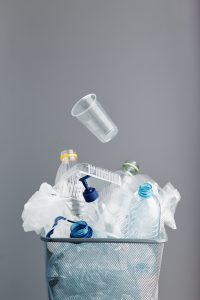The word ‘plastic’ originates from a Greek word meaning ‘pliable’ or ‘fit for moulding.’ For centuries it was an adjective, used to describe something or someone that could bend and contort without breaking. Sometime in the 20th century ‘plastics’ became a noun—and what a noun it has become! Some of you may remember the film The Graduate, in which young Benjamin received advice to “pursue a career in plastics.” Well, many did and, thanks to mass production and globalization, plastic now permeates virtually every corner of our lives. So much so, that we now realize that to protect our planet we have to make some tough decisions and significantly reduce our use of plastics—particularly single-use or disposable plastics.
Earlier this year Canada’s federal government gave notice of a ban on six single-use plastic products. As of 2022 single-use plastic grocery bags, straws, stir sticks, cutlery, six-pack rings and food containers made from hard-to recycle plastics will be banned. Fast food chains, food retailers and wholesalers, even manufacturers within their supply chains, are already taking steps to replace these plastics with more environmentally friendly alternatives. This, plus measures local governments are currently considering, is all good news. It’s a clear first step, but is neither soon enough nor aggressive enough to resolve the mounting issue of plastic pollution in our landfills and our oceans.

As citizens we can’t rely on governments alone to lead this change. Personal, grassroots action is required, knowing that every bit counts in reducing our use of plastics. For those of you who want to kick-start your personal plastic-reduction campaign, here are some everyday tips (or reminders) that will help reduce your reliance on plastics significantly.
The #1 way to reduce our reliance and overall use of plastic (both single-use and the more durable type)? DON’T PURCHASE products either made with or packaged with plastic. Since so much of what we want and need comes wrapped in plastic, this will require an extra step to avoid bringing unnecessary plastics into your home. We aren’t suggesting that you toss out any plastic products you may already own and use; use them as long as you can. However, when the time comes to replace them, please consider investing in the future by seeking out eco-friendly alternatives whenever possible.
Some plastic-reduction measures such as bringing reusable shopping bags for grocery shopping are already wide-spread—and many shoppers go further and avoid plastic bags for fruits and vegetables, as well. Increasingly food retailers sell reusable bags for produce and/or we can buy the products loose. Look for and ask for cardboard containers for berries and give those heavily packaged cheese and cold cut slices a pass. Most of Orillia’s food retailers have deli counters where you can order just the right amount, avoid plastic packaging, and support your neighbours working behind the counter. A win-win-win!
Opt for natural products or alternatives. Toothbrushes are a good example. Did you know that close to 1 billion used plastic toothbrushes are thrown out annually? That adds up to 50 million tonnes of landfill which takes centuries to break down, if ever. Instead, toothbrushes made with natural products like bamboo are now available. Many dentist offices recommend and offer their patients bamboo toothbrushes. The good news is that these toothbrushes only take six to seven months to biodegrade.
Another opportunity for plastic reduction is tucked away in our clothes closet. Hampers, hangers, shoe racks, and dry-cleaning bags are everyday sources of plastic. Here are some alternatives to consider. In lieu of plastic laundry and clothing hampers, how about hampers made with wooden frames and linen or canvas bags? Wooden hangers may cost a bit more, but they are more durable than plastic ones and for some reason our clothes look better on a wooden hanger. Leave plastic hangers at the store. There is more choice than ever in storage solutions these days – including shoe organizers made entirely from natural materials. It may take time to embed an alternative for plastic dry-cleaning bags; however, we can take comfort that those dry cleaning bags can be recycled, so long as they are clean and tag-free. Simply include them in your bag of plastic bags for recycling.
Let’s close with a short note on food and drink containers. They are another major opportunity area for plastic reduction and, as mentioned above, one that is already targeted by governments and major fast food chains. At home we can switch to glass and metal food containers for lunch boxes and left-overs. If you do use plastic bags for lunches or freezing, remember they can be washed and reused many, many times. Biodegradable straws are becoming more affordable. Most importantly, please avoid buying beverages bottled in plastic wherever possible.
Orillia has an excellent blue-box program (www.orillia.ca/en/living-here/recycling.collections)
that collected an estimated 516 tonnes of plastic last year. The amount of plastic being collected for recycling in Orillia is going up every year, signalling that more people are recycling—which is a good thing—but it also suggests that people are using more plastic. Ultimately the best statistic is one that confirms we are significantly reducing our overall use of plastics. Let’s make that our goal.
Watch for more news and tips on how to reduce plastic use in future Sustainable Orillia articles.
